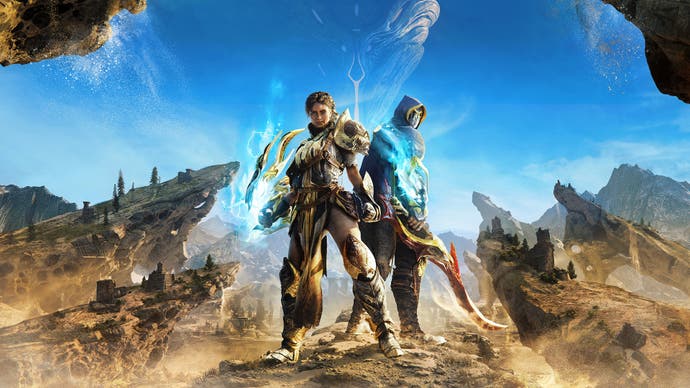Atlas Fallen review - memorable monster-slaying in a forgettable world
Mapped out.
Atlas Fallen feels like a dream. Not because it's incredible, but because it's already hazy. My memories of it are comfortably curled alongside memories playing Warhammer: Space Marine, Darksiders, Kingdoms Of Amalur, and other X360/PS3 action games that I just about remember the names of. That boils down to the fact that Atlas Fallen's combat is good fun, sometimes really good fun, but it's too often bogged down by, well, almost everything else. Though I still have a sneaking suspicion that I'll look back at the game in 10 years, mistakenly call it Atlas Rising, and then have fond but hazy flashbacks of the button-mashing monster-smasher.
If looking back at Atlas Fallen feels slightly foggy, that's at least partly due to its well-worn post-apocalyptic fantasy backdrop, in which an oppressive God (Thelos) has divided the human population between the mistreated "Unnamed" and everyone else who's blindly religious. Playing as a poor Unnamed, you soon stumble upon a chatty gauntlet that holds both immense magical power (hello, Forspoken) and a long-forgotten Avatar-looking God whose buttcheeks are always on show. He happens to have beef with Thelos, so the conveniently-matched pair quickly get to work exposing it as an evil entity.
After that, there's honestly not much to spoil. Everything plays out almost exactly as expected as you restore the gauntlet to its former glory, and the game never deepens or expands on its early idea of a divided society. The Unnamed are generally mistreated, but none of the characters can offer any justification for the oppression other than that arbitrary Unnamed label. Recurring characters are similarly featherweight, including a rude guy who's set up as our main rival before disappearing for almost the entire game and showing up at the end.
The main problem is that all the conflicts and relationships and animated backstory cutscenes are purely functional. They're just here to explain why you need to beat up baddies, and that's fine, but Atlas Fallen might have been better off leaning into its inherent silliness. This is a mid-budget B-action-film in video game form. Don't tease me with a couple over-dramatic voice lines, Atlas Fallen - give me a whole load of it. The game instead plays everything with a straight face, which is definitely mismatched with the over-the-top goings on.
While the excuse to beat up baddies is sub-par, the actual monster-slashing-thrashing-lashing is the game's highlight, both for its stylish visual splendour and for its frantic intensity. The two-in-one gauntlet lets you talk to a God (yawn) and turn sand into devastating shape-shifting melee weapons (hurray), which obviously looks cool, although pulling off the magical feat is fun, too.
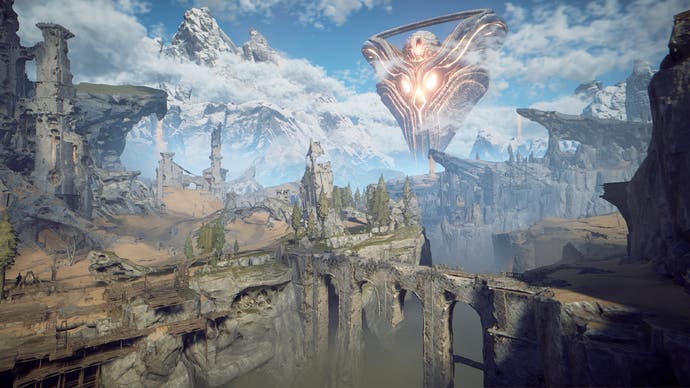
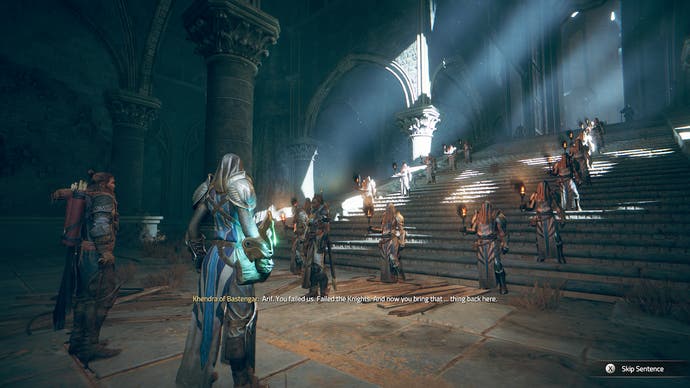
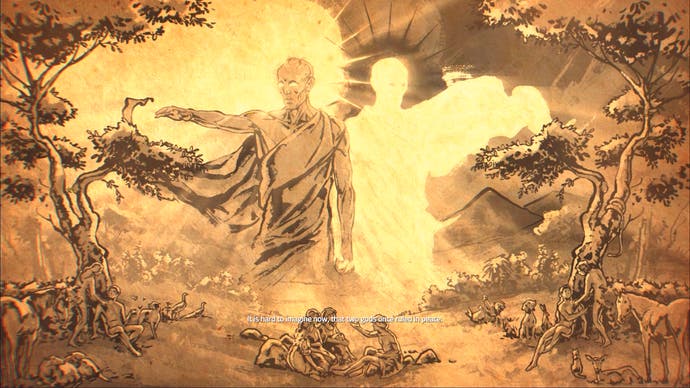
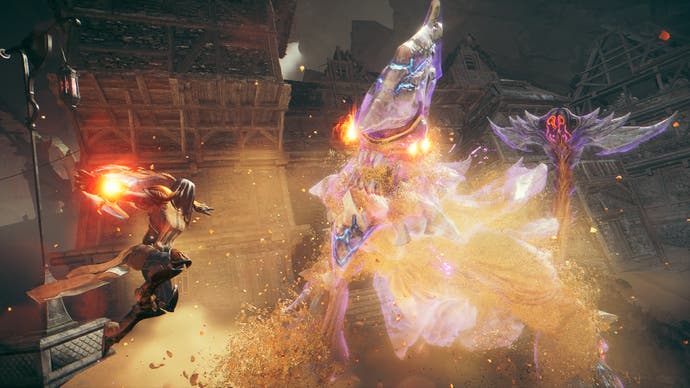
Atlas Fallen's main combat gimmick is a gauge for Momentum, which fills up after hitting a foe and slowly transforms your weapons - an axe-hammer hybrid, a chain, and fantasy boxing gloves - into ever more deadly tools. You can only equip two weapons at any time, but with maxed out Momentum your chain turns into a wide whirlwind of debris that's handy for scattered foes, while your buffed gloves eventually give you multiple buffed arms to quickly punch up giant sand crabs.
Being armed with an increasingly bombastic trio of weapons comes with some screwed on risk, as higher Momentum counters your increased damage output with lower defence. Though you can negate that gamble by dumping all your Momentum in one ultra-move, so difficulty is somewhat changeable on the fly - in addition to the actual difficulty options. Choosing to save, reserve, and then blow your Momentum on a snazzy ultimate skill at the right moment is always thrilling, and that cycle also gives every showdown a nice ebb and flow.
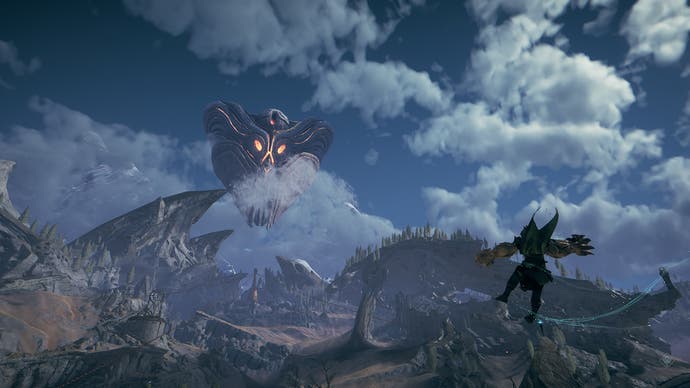
But that flow is also constantly in flux and rarely feels like the same experience twice. Taking a page from other modern hack-and-slashers, Atlas Fallen puts heavy emphasis on the parry, but this one also crystallises enemies, putting them in a slo-mo stasis like something conjured out of Bayonetta's witch time. Parrying feels so great in Atlas Fallen because the enemies - from the cannon fodder rookies to the various towering mini-bosses - are absolutely vicious (on Normal difficulty, at least). They don't wait for you to move before striking; they pounce, swing and claw relentlessly, so learning and keeping up with their dance moves is constantly satisfying.
Even after I memorised an attack pattern and could practically react to it with my eyes closed, no two encounters really felt the same. By the time Atlas Fallen's midpoint strikes there'll be so many projectiles flying across the battlefield, little sand hounds leaping toward you from every angle, and a massive wrinkly worm digging through the ground at your feet. When the split second twitchy counters mix with the longer-ish-term Momentum-based decisions, combat once again channels the stylish action greats - minus all the combos - and feels rhythmic. If you listen closely, you can almost hear the block, block, dash, block, kill kill kill kill kill by listening to the mashing of buttons.
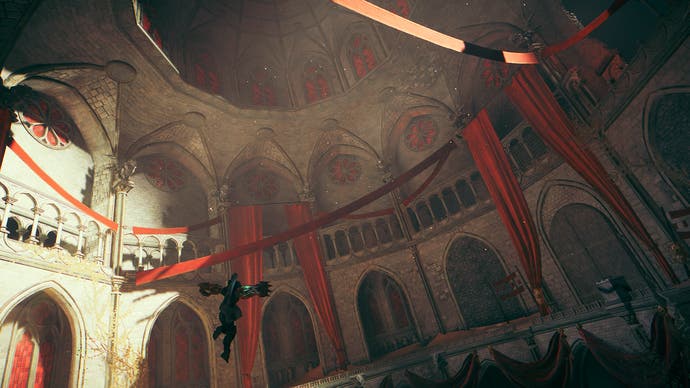
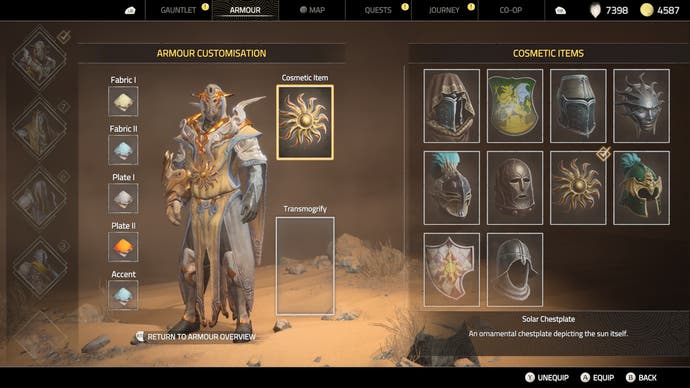
Badass shape-shifting weapons aside, Atlas Fallen also gives you a wide selection of equipable cooldown spells, from a throwable tornado to an area-of-effect dome that slows down all monsters and projectiles in its vicinity. There's a bunch of passive skills to choose from as well, moving between the chronically overused minor stat buffs to genuinely useful boons like an explosion that activates after you've been hit.
To upgrade those spells and passive skills, however, Atlas Fallen falls into the perpetual resource hunt that fluffs countless other open-worlders. Collecting seven pieces of clover to make my sand tornado a teeny bit more powerful is slightly far-fetched, even for a high fantasy world like this. But the bigger worry is the mind-numbing open-worldisms that pull Atlas down. The various disconnected areas are filled with fetch quests and glorified postal delivery missions, and the only interesting part is when you inevitably go Super Saiyan on some poor beasts.
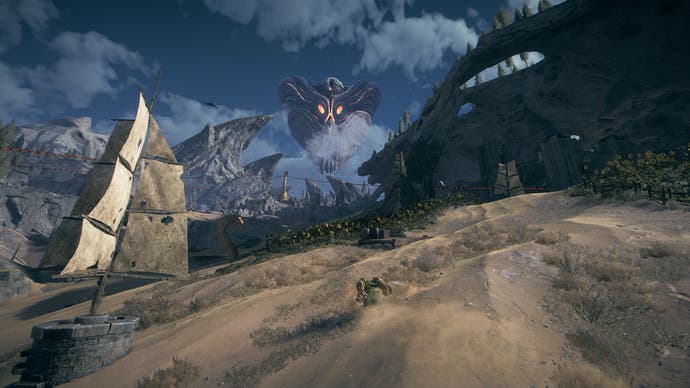
Chasing quests, buried treasure, glowing blue collectibles, and the seven shrooms needed to upgrade a minor skill is kinda mindless, but not necessarily in a terrible sense. I'd compare the feeling to the sensation you get after a short, familiar walk where you've inexplicably blacked out half the trip. Or maybe a better comparison would be Crackdown and how it captured the pleasures of a 3D collectathon in an open world. Like that superhero shooter, Atlas Fallen has an awful amount of chaining double jumps, air dashes, and a sick sand slide to reach small rewards dangling in all corners of the game's dunes. The floaty platforming doesn't get quite as exaggerated as Crackdown's, but the effect is largely similar, sending you zig-zagging in pursuit of a treasure hunt that's fun while it lasts, even if what you gain from it is ultimately pointless.
Mindless, pointless, and mind-numbing are all probably descriptors that sound too harsh for Atlas Fallen because, again, it's mainly good old simple fun. Sure, it takes itself way too seriously and the loot chase can get monotonous, but everything outside of the monster-slaying is just an excuse to get right back to the monster-slaying. Or make the monster-slaying cooler with upgrades. Sometimes your noggin needs a break from working overtime to slide on rolling deserts and hammer monst
